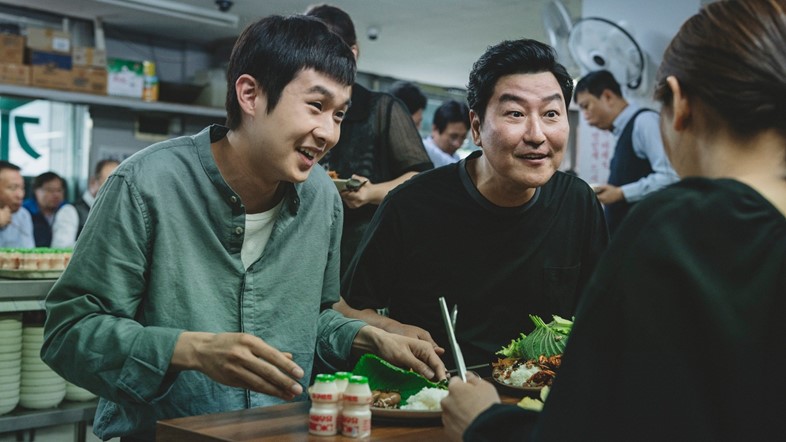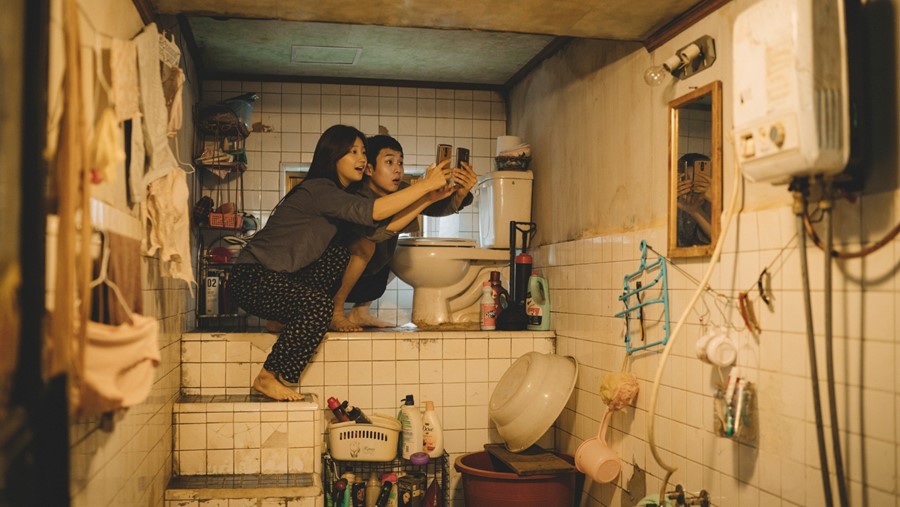First-time screenwriter Han Jin Won on working on Bong Joon-ho’s movie Parasite, the first South Korean film to be nominated for six Oscars
Shortly after finishing his frozen dystopia, Snowpiercer – a glossy, high-stakes sci-fi thriller starring Chris Evans, Tilda Swinton and Jamie Bell – director and auteur Bong Joon-ho hurriedly dashed off a handful of pages of story loosely inspired by his experiences working as a private maths tutor for a wealthy family in South Korea. The treatment, set in two households – one rich, one poor – was originally intended for the stage but over the years it evolved, expanded and switched media. Eventually, it became Parasite, a cinematic paragon that’s made history as the first South Korean movie to win the Palme d’Or at Cannes and the first South Korean film to be nominated for six Oscars (including Best Picture, Best International Feature and Best Director). Last week Parasite added two BAFTAs to its growing list of accolades – Best Film Not in the English Language and Best Original Screenplay.
The film’s meteoric rise has been a remarkable journey for director, cast and crew; perhaps none more so than first-time screenwriter Han Jin Won. When Han first saw his name side-by-side with Bong’s, officially listed as co-writer on the film, he was shaken. “My hands were trembling, I hid in my favourite cafe, I couldn’t believe it,” he says. After showing the script to his mother, the two cried together, overcome with excitement, gratitude and shock – it was a far cry from Han’s original role on the film. Previously a production assistant on Snowpiercer, Bong handed him a half-finished treatment to look over while he was shooting Okja for Netflix. “He asked me to start doing some research, originally just for three months.” What began as an informal request, quickly became much more involved. Han began conducting interviews, spending weeks at a time meeting and speaking with housekeepers, tutors and chauffeurs. He visited cramped, lower-class semi-basements and photographed Seoul’s sprawling, wealthy suburbs. “All the time I wasn’t sleeping I spent on research,” he says. “I worked really hard because Bong is a director I really respect. He was like a teacher to me, he guided me so well.”

Impressed at the wealth of recordings, clips and anecdotes that he’d collected, Bong eventually asked Han to try his hand at turning the rough treatment into a finished screenplay. Han wrote three different versions of the story, each shaped by feedback from Bong, gradually building a library of ideas that the director could draw from once he’d finished Okja. “I focused on developing the characters. Plot situations are very important, but for me, I enjoy engaging with the characters the most,” he says. Particularly interested in the power dynamics at play, Han began to peel past the stated rules and responsibilities of the staff he spoke to, uncovering the hidden subtleties inherent in each role. “They were so much more than just housekeepers, some had become the de facto lady of the house.”
After Okja was released in 2017, Bong returned to Parasite working alongside Han, finishing the final half of the film in a sudden, inspired frenzy. The result of this partnership – Bong’s creative flair and Han’s obsession with character – is a film that’s gripping, tense, darkly comic and captivatingly original. Parasite defies genre – it shifts and reshapes by turns. What begins as an amusing trick on the wealthy Park family gradually morphs into a satirical struggle for social mobility, switching again into a heart-racing scramble to sustain the Kim family’s falsehoods, before finally, inevitably concluding with a dramatic and fatal climax. Moments of levity, such as when art therapist Ki-jung divines the hidden meaning behind Da-song’s hideous childhood paintings, sit side-by-side with moments of real sadness. “The scene where the original housekeeper gets fired,” says Han. “Up until that point, I don’t think there’s any real tragedy yet. This is the beginning of the true tragedy of the film.”
Parasite clearly, compellingly articulates the ever widening gulf between rich and poor – it’s a message that speaks to our current moment, made all the more urgent by growing partisanship the world over. “What’s interesting about this story is that it could be our story,” says Han. “It could be the story of our neighbours, of someone we know.” But while this message is easily understood, it’s not simplistic – the film has no heroes, no villains, says Han. “It represents the complexity of people. Everything depends on the situation, you respond to it based on your own intuition.” Crucially for Han, while Parasite engages with serious questions about the state of the world, it’s not sanctimonious in tone – adopting a moralistic tone just wouldn’t have worked. “There’s a lot of humour in it, and I do think the film has a hopeful streak,” he says. “Every situation, even tragic situations are embedded with humour. I think that’s a realistic part of life... Also, we knew that no one would stay interested in something very serious for two hours.”
Parasite releases at Curzon and select cinemas nationwide from February 7, 2020.
